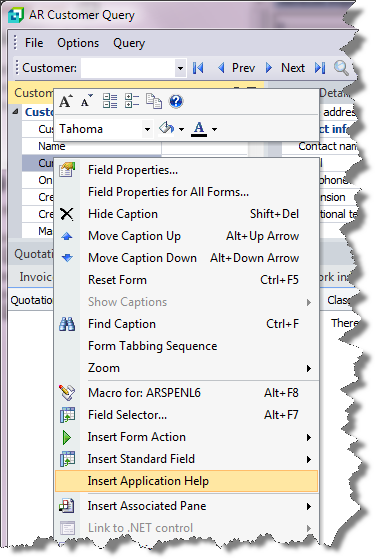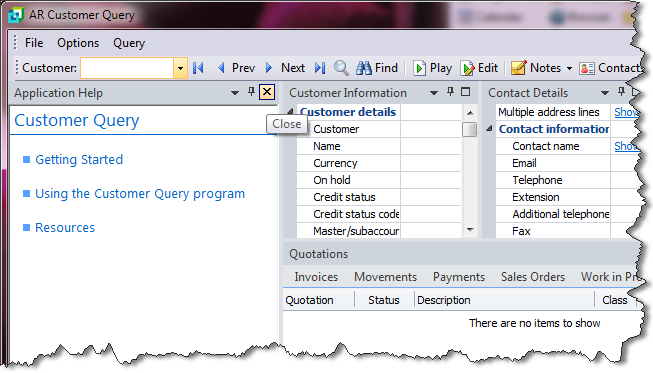You use this program to view details of contracts for specific customers and/or buying groups where you have negotiated the sale of inventory items at a fixed price over a specific period of time.
Contract prices for buying groups are added using the Add Contracts (Buying Groups) program. Contract prices for customers are added using the Add Contracts (Customers) program. All contract types are maintained using the Sales Order Contract Maintenance program.
- Toolbar and menu
- Review Criteria
- Contract Prices
- All Contract Prices
- Listview columns
- Notes and warnings
| Field | Description |
|---|---|
| Start Review | Select this to display the details of contracts according to the selections you indicated in the Review Criteria pane. |
| Change Criteria | Select this to change your selections in the Review Criteria pane. |
The options in this pane enable you to indicate which contracts you want to display.
| Field | Description |
|---|---|
| Buying group selection | Indicate the buying group(s) for which you want to display contract details. |
| Include buying groups | Select this to include contracts for buying groups. These are contracts for a pre-defined group of customers, commonly known as a buying group. |
| Buying group filter | Indicate the specific contract(s) for which you want to display the details. |
| Customer selection | Indicate the customer(s) for which you want to display the contract details. |
| Include customers | Select this to display contracts for specific customers where you have negotiated the sale of inventory items at a fixed price over a specific period of time. |
| Customer filter | This enables you to indicate the specific customer(s) for whom you want to display the contract details. |
| Stock code selection | This enables you to indicate the stock code(s) for which you want to display contracts in the listview. |
| Stock code filter | This enables you to indicate the specific stock code(s) for which you want to display the contract details. |
| Contract selection | This enables you to indicate the contract(s) for which you want to display in the details. |
| Contract filter | This enables you to indicate the specific contract(s) for which you want to display the contract details. |
| Contract start selection | This enables you to indicate the contract start date(s) for which you want to display contracts in the listview. |
| Contract start filter | This enables you to indicate the specific contract start date(s) for which you want to display the contract details. |
| Expired contracts | |
| Include expired contracts | Select this to include details of expired contracts. |
| Contract price method selection | This option enables you to indicate the contracts you want to display in the listview based on the pricing method defined against the contract. |
The treeview in this pane displays all the contracts you selected to include in the Review Criteria pane.
You use your mouse pointer to highlight an entry in the treeview to indicate which contract details you want to display in the All Contract Prices pane.
The heading for the Contract Prices pane changes according to the selection you make in the treeview.
| Field | Description |
|---|---|
| All Contracts | Select this to display details of all contracts in the listview. |
| Buying groups | Select this to display details of contracts for buying
groups only in the listview. Alternatively, you can select to view an individual buying group contract, by highlighting the required contract. |
| Customers | Select this to display details of customer contracts
only in the listview. Alternatively, you can select to view an individual customer contract by highlighting the required customer. |
When you select an entry in the Contract Prices treeview, the contract details for the corresponding treeview entry are displayed in this listview pane.
![[Note]](images/note.png)
|
|
|
The contract details are displayed when you hover your mouse pointer over a contract code. |
|
| Field | Description |
|---|---|
| Add | Select this to add a new contract. If you selected to view details for a buying group in the Contract Prices treeview, then you use the Add Contracts (Buying Groups) program to add the new contract. If you selected to view details for a customer contract in the Contract Prices treeview, then you use the Add Contracts (Customers) program to add the new contract. |
| Change | Select this to use the Sales Order Contract Maintenance program to maintain the entry currently highlighted in the listview. |
| Notepad | Select this to use the Notepad Editor program to assign free format notes to the entry currently highlighted in the listview. |
| Column | Description | ||||
|---|---|---|---|---|---|
| Buying group/Customer | This is indicates the buying group or customer number, depending on your selection in the Contract Prices treeview. | ||||
| Stock code | This indicates the stock code assigned to the pricing contract. | ||||
| Sales contract |
|
||||
| Start date | This indicate the date on which the contract becomes effective. | ||||
| Expiry date |
This indicate the date on which the contract is no longer valid. An entry of 00/00/00 indicates that there is no expiry date (i.e. the contract does not expire). |
||||
| Pricing method |
This indicates the pricing method for the contract and can be one of the following:
|
||||
Electronic Signatures provide security access, transaction logging and event triggering. This enables you to increase control over your system changes.
Access to the following eSignature transactions within this program can be restricted at Operator, Group, Role or Company level. You configure this using the Electronic Signatures program.
| eSignature Transaction | Description |
|---|---|
| SO Add contract pricing |
Controls access to the New and Add functions in the Contract Prices and Sales Order Contract Maintenance programs. |
| SO Change contract pricing |
Controls access to the maintenance of contract pricing in the Contract Prices and Sales Order Contract Maintenance programs. |
| SO Delete contract pricing |
Controls access to the Delete function in the Contract Prices and Sales Order Contract Maintenance programs. |
Inserting Application Help
You would typically follow this procedure to display help for the current program in a customized pane that can be pinned to the program window.
Information includes step-by-step instructions for the various functions available within the program, including a brief overview of what the program does, what setup options are required and how to personalize the program.
-
Open the program for which you want to insert application help into a customized pane.
This functionality is only available for a program that has panes.
-
Right-click any form field.
You can also click the triangle menu icon that appears in the title area of a pane.
-
Select Insert Application Help from the context-sensitive menu.
The application help appears in a pane within your program. You can reposition the pane using the docking stickers or pin it to the program window.
Removing the Application Help pane
If you no longer want to display application help in a pane for your current program, you can simply remove it.
-
Select the Close icon in the right-hand corner of the application help pane.
-
Confirm that you want to delete the pane.

